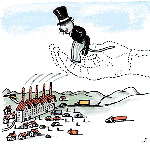School’s back in session today. I hope Spring Break recharged everyone’s batteries. Mine had its moments, although it didn’t quite rise to earlier expectations. It was, in fact, the sort of week that can reconfirm a skeptic.
 I’m from Missouri, you have to show me something. Honestly, though, my own experience doesn’t bear out that state’s reputation for skeptical self-circumspection. In fact, St. Louis in the 19th century was a hotbed of Hegelianism.
I’m from Missouri, you have to show me something. Honestly, though, my own experience doesn’t bear out that state’s reputation for skeptical self-circumspection. In fact, St. Louis in the 19th century was a hotbed of Hegelianism.
Maybe that’s why my fellow undergrad philosophy majors and I communed every Friday afternoon (c. 1978) at a now long-gone little deli/pub on the Mizzou campus in an informal thinking-and-drinking club we pretentiously dubbed the Hegel Society. What did we know? (We should have been the Montaigne Society!)
Be all that as it may, today we turn our attention to classical British empiricism (not yet radicalized by William James).
John Locke (1632-1704) gave us the tabula rasa, assumed that the mind was a blank tablet… an empty closet illuminated only by the light that enters from the outside. Don’t get Steve Pinker started…
Bishop George Berkeley (1685-1753) was an odd empiricist, since he was also what empiricists usually are not: a metaphysical idealist. “To be is to be perceived.” Except when it’s not. I still like Dr. Johnson’s “refutation.”
David Hume (1711-1776) saw the limits of reason and resolved to live skeptically in response. Hume’s skepticism was, paradoxically, the clearest example of solid, self-scrutinizing Enlightenment thinking. Our most basic beliefs and behaviors rest on a foundation not of a priori Cartesian certainties but upon custom, habit, social tradition, and common sense.
 “It is not against reason that I should prefer the destruction of half the world to the pricking of my little finger.”
“It is not against reason that I should prefer the destruction of half the world to the pricking of my little finger.” But I definitely should not prefer it.
But I definitely should not prefer it.
That’s what Hume’s pal the economist would have said, too.
Adam Smith (1723-1790). The American ideology has always invoked the magical authority of his “invisible hand” in support of the proposition that individuals behaving selfishly in free markets would invariably result in “the overall good of society,” thus always and paradoxically ratcheting up the spiral of freedom for ambitious individuals on their respective missions of personal acquisition and self-aggrandizement.
Actually, though, Smith– David Hume’s best friend– agreed with the skeptic that free-market capitalism can only secure a rich and rewarding freedom in the largest sense when individuals seek to coordinate their respective entrepreneurial aspirations with the well-being of the community at large. Contrary to inherited convention, Smith believed that people are not essentially selfish or self-interested but are essentially social creatures who act out of sympathy and fellow-feeling for the good of society as a whole. A decent free-enterprise system would only be possible in the context of such a society.
rewarding freedom in the largest sense when individuals seek to coordinate their respective entrepreneurial aspirations with the well-being of the community at large. Contrary to inherited convention, Smith believed that people are not essentially selfish or self-interested but are essentially social creatures who act out of sympathy and fellow-feeling for the good of society as a whole. A decent free-enterprise system would only be possible in the context of such a society.